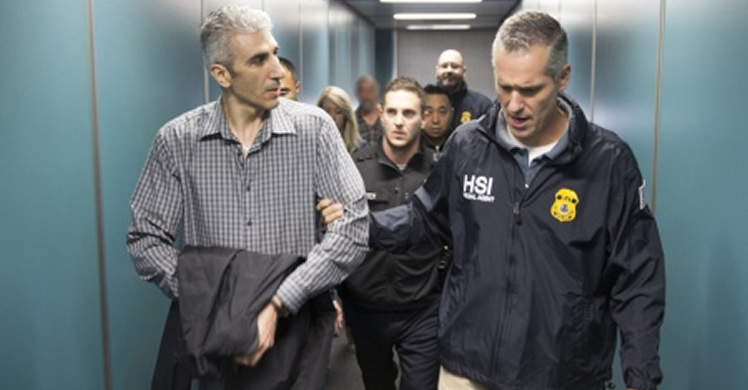UK resident connected to Syrian export scheme extradited to US to face federal charges
PHILADELPHIA — A dual citizen of the United Kingdom and Syria was extradited from the U.K. Thursday and was arraigned today for his alleged part in a conspiracy to illegally export laboratory equipment, including chemical warfare agent detection equipment, from the United States to Syria. The charges and extradition follow an extensive international probe led by U.S. Immigration and Customs Enforcement’s (ICE) Homeland Security Investigations (HSI).
The announcement was made by Special Agent in Charge John Kelleghan of the HSI Philadelphia Office, Special Agent in Charge Sidney Simon of the U.S. Commerce Department’s Office of Export Enforcement (OEE) New York Field Office, Assistant Attorney General for National Security John P. Carlin, and U.S. Attorney Peter J. Smith of the Middle District of Pennsylvania.
London resident Ahmad Feras Diri, 42, recently lost his extradition fight in the U.K. He turned himself over to HSI and Department of Commerce special agents Thursday morning and pleaded not guilty at his initial appearance today in the Middle District of Pennsylvania federal court in Scranton.
He was arrested by the Metropolitan Police in London March 14, 2013, in connection with the pending U.S. charges but fought the extradition. The federal indictment was unsealed in April 2014 and stems from an investigation led by HSI Philadelphia special agents in partnership with the Department of Commerce (DOC) Office of Export Enforcement.
He was indicted by a grand jury in November 2012 along with Harold Rinko, 73, of Hallstead, Pennsylvania, and Moawea Deri, a Syrian citizen. The firm, with which Ahmad Feras Diri and Moawea Deri were associated, was also charged in the indictment.
The indictment alleges that federal legislation and export controls seek to shut down the supply chain used by the Syrian state to support terrorism and to develop and proliferate weapons of mass destruction, including chemical weapons. Pursuant to regulations of the DOC's Export Administration, a license is required to export goods and services from the United States to Syria, other than limited and certain categories of humanitarian food and medicine.
The indictment further charges the three individuals and the company with criminal conspiracy, wire fraud, illegal export of goods, money laundering, and false statements.
According to the indictment, from 2003 until charged, it’s alleged through his firm, d-Deri Contracting & Trading, Diri was exporting goods originally from the United States from Rinko, who owned the Global Parts Supply business in Pennsylvania. Diri was then exporting those goods, including sensitive laboratory equipment, to his brother and business partner, Moawea, in Syria.
Rinko admitted in federal court in September 2014 that he conspired to export items from the United States through third party countries to customers in Syria without the required U.S. Commerce Department licenses. According to Rinko’s signed factual stipulation, the conspirators prepared false invoices that undervalued and mislabeled the goods being purchased and also listed false information about the identity and geographic location of the purchasers of the goods. The stipulation indicates that the items would be shipped from the United States to Jordan, the United Arab Emirates, and the United Kingdom, and thereafter transshipped to Syria.
Moawea Deri remains at large and is considered a fugitive.
The items exported allegedly included: a portable gas scanner used for detection of chemical warfare agents by civil defense, military, police and border control agencies; a handheld instrument for field detection and classification of chemical warfare agents and toxic industrial chemicals; a laboratory source for detection of chemical warfare agents and toxic industrial chemicals in research, public safety and industrial environments; a rubber mask for civil defense against chemicals and gases; a meter used to measure chemicals and their composition; flowmeters for measuring gas streams; a stirrer for mixing and testing liquid chemical compounds; industrial engines for use in oil and gas field operations and a device used to accurately locate buried pipelines.
“According to the charges in the indictment, Ahmad Feras Diri conspired with his brother and others to evade U.S. export laws and illegally send chemical laboratory equipment to Syria,” said Assistant Attorney General Carlin. “These violations of U.S. export law threaten our national security, and we will continue to hold accountable those who seek to circumvent restrictions. I want to thank the agents, analysts, prosecutors and our U.K. law enforcement counterparts who are responsible for the arrest and charges in this case.”
Commerce Department Office of Export Enforcement New York Field Office Special Agent in Charge Sidney Simon cited the close cooperation of federal law enforcement agencies throughout the case. "I commend our colleagues from HSI and the United Kingdom, and the U.S. Attorney's Office, for their outstanding work with the Commerce Department on this case," said Simon. "Our special agents work tirelessly every day to pursue those who flout our export control laws and attempt to supply anyone with technology that threatens our national security. OEE will seek and arrest violators wherever located, worldwide, and we will continue to leverage our unique authorities as the only federal law enforcement agency exclusively dedicated to enforcing dual-use export violations."
The case is being prosecuted by Assistant U.S. Attorney Todd K. Hinkley and Mariclaire Rourke, trial attorney with the U.S. Department of Justice, National Security Division, Counterintelligence and Export Control Section.
Indictments are only allegations. All persons charged are presumed to be innocent unless and until found guilty in court.


